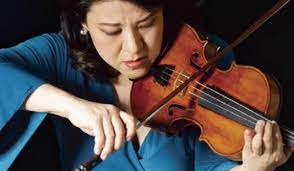Delayed return recital visit by IVCI gold medalist Takezawa was worth the wait
The second International Violin Competition of Indianapolis will always bulk large in my memory because it provided the immediate reason for my hiring by the Indianapolis Star.
 |
| In performance, intensity and good taste are blended. |
So the chance to see and hear the winner of that 1986 contest in recital was not to be missed. Kyoko Takezawa has built on her victory that September to mount a significant international career. The recital with Indianapolis pianist Chih-Yi Chen had to be delayed, then rescheduled, as one of the many inconveniences caused by the Covid-19 pandemic.
The current Laureate Series headed toward its conclusion Tuesday evening at the Indiana History Center. The violinist's regard for Indianapolis as a "second hometown" was signaled by the presence in the audience of her host family from nearly 36 years ago and her dedication of Chopin's Nocturne in D-flat, op. 27, no. 2 (in transcription) to the memory of Ania Beczkiewicz (1943-2018), the wife of IVCI founding director Thomas J. Beczkiewicz.
That performance was the briefest on the program, with a place of honor right after intermission, and of course was tenderly played, drawing on the violinist's memories of the dedicatee. The rest of the second half was magnificently filled with Saint-Saens' Sonata No. 1 in D minor, op. 75. Over four expansive movements, the work summarizes the composer's top-drawer manner as the icon of French romanticism in tidy form.
The piece works well with a light approach throughout, but also as full-bore scrutiny of the expressiveness that continues to draw music-lovers to the era from which it emerged. That was how Takezawa and Chen performed it. Saint-Saens was ever a learned composer who wore his learning lightly. It was Hector Berlioz who quipped about his younger compatriot: "He knows everything, but he lacks inexperience." The romantics made a virtue of inexperience in spiritually awakened youth; they prized a kind of freshness that bordered on naivete. Saint-Saens seems to have skipped that phase.
The finale, with its fast-paced demands on both players, in this performance was exhilarating throughout. They demonstrated that emotional breadth and even depth are not the exclusive preserve of the Austro-German tradition. That tradition was represented by the opening piece: Brahms' Violin Sonata No. 1 in G, op. 78. The work seems to suit Takezawa's temperament. Her warm tone and capacity for reflective pacing brought out the music's gracefulness, fully in sync with the pianist's own.
The well-balanced duo stature of the performance was admirable. Especially winning was the decisive, spirited ending they gave to the opening movement. A brief piano interlude before the violin's final phrases in the second movement set up the conclusion perfectly. The finale sustained a momentum over the course of the coordinated, varying tempos.
The duo rapport was tested in Ernest Bloch's "Baal Shem Suite," which to a large extent focuses all its sensitivity and seriousness on the violin. Takezawa didn't need to soar into the upper reaches to be convincing in her mastery of the singing tone that's so vital to Bloch's language. The fast, somewhat dreamlike finale confirmed the brilliance of the concert's partnership.
After the Saint-Saens sonata, Chen and Takezawa responded to the tremendous ovation with two encores, both lyrical bonbons in a situation where maybe the choice of one would have been sufficient: Richard Wagner's "Albumblatt" and the Adagio from Schubert's "Arpeggione" Sonata. The encore favorites received whole-hearted readings nonetheless, setting a seal upon this gold medalist's return to her second hometown.



Comments
Post a Comment